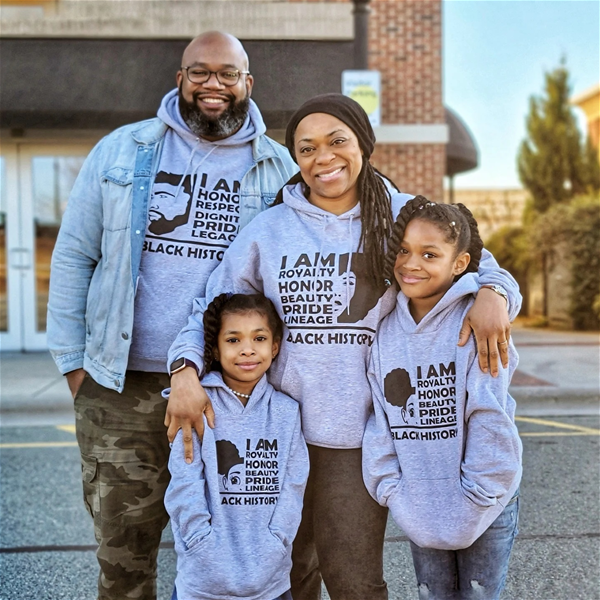
Self-Help VP of Diversity, Equity and Inclusion Quinton Smith and his family
This year—just a few days ago, in fact—my father turned 75 years old. Born February 4th, 1948, my Pops was raised in the small county of Buckingham, Virginia, an extraordinarily rural place once settled by plantation owners seeking new land.
While opportunities were scarce and much of the land continued to be owned by those who didn’t look like my father or his family, they still made a way. His mother was a homemaker who cared for a growing brood, and his father managed to secure a good job doing roadwork for the state.
The family still struggled to make ends meet, however, so my dad and his siblings would often go work the fields for white farmers in the area and be sent home with extra vegetables, fruits, and scraps of meat. My father would eventually drop out of school so that he could work and help support the family, although he did mange to get his GED before heading off to the military.
Despite serving in three different capacities (Army, Reserves, National Guard), the military life ultimately wasn’t for him, and Pops found a job with the state (kind of like his own father) where he remained until he retired.
If you were to ask him today what he’s most proud of, my dad would have no shortage of things to pick from. He could talk about working on his hands and knees, picking tobacco, to save up money to buy his first car, or how good he had become over his lifetime in contracting and landscaping.
He could talk about the trophies he won in car shows for the cars he would build, or supervising college graduates at work even though he felt uneducated himself. But if I had to place a bet, I’d say that it’s his family he’s the most proud of; that a poor country boy like him was about to have two sons, three granddaughters, and a great grandson, all living a life so far beyond what he could’ve imagined as a kid.
Now, dear reader, while you may be enamored with my musings on my father, you may also be wondering what exactly this all has to do with Black History Month. Well, the theme for BHM this year is “Black Resistance”, and I think this is a fascinating subject.
According to Dictionary.com, resistance can be defined as “the act or power of resisting, opposing, or withstanding,” and “the opposition offered by one thing, force, etc., to another.” Opposing, withstanding, standing against.
Like legs and feet driving into the ground and pushing your body forward against a headwind. Like hands held in front of you to cut through the current as you move up a river. Often, when we think about resistance in regards to Black people, history, and culture, a lot of the usual suspects float to mind. Sit-ins and marches to protest injustice; speeches and boycotts to assert our humanity.
We see the usual slate of famous Black faces that have adorned classroom walls every February, and we learn about the Civil Rights Movement and how Black folks resisted the unfairness of our society to make a better way. And while these depictions are certainly valid, they do not account for the acts of resistance we engage in simply through our persistent existence in a world not made for us.
See, my father was born a scant 85 years after the official death of slavery, and just 27 years after the Tulsa Race Massacre occurred. He was 7 years old when Emmett Till was murdered for doing nothing except being Black in a place and time where a lie would end your life, and 15 when the KKK killed four little Black girls by bombing the 16th Street Baptist Church in Birmingham, Alabama.
He was 16 by the time the government enacted laws to bar discrimination and 17 before Black folks could have legal protection at the ballot box. My father, like many from that time, overcame innumerable barriers in a world truly built without his success in mind.
He endured a society that only recently considered he and his people to be human, and helped out his family, served his country, developed many different talents, and started a family that thrived. His resistance wasn’t found in the lines of protest or the speeches of intellectuals.
It was in the daily success of a man who continued moving forward even when the path was hard. Who made mistakes, but still tried his best. Who loved his kids, and gave them the best he could. His resistance was living.
So today, good people, I ask you to do the same, and make your life your act of resistance. In a world that makes us feel as if what we do is never enough, and that who we are is never good enough, maybe that is learning to rest.
When people continue to demand more and more from us, and the lines between work, life, family, friends, and self all become blurred, maybe it is learning how to set boundaries. Maybe its finding the things that give you the most love and joy as a way to push back against the glut of hate and pain that this world is capable of.
Maybe it is self-care, or fitness or education. Good parenting, good partnering. Good friendships and good times. Resistance is opposing the broader forces and withstanding that which the throw your way. And sometimes, Black people, our resistance is simply the breath in our lungs.